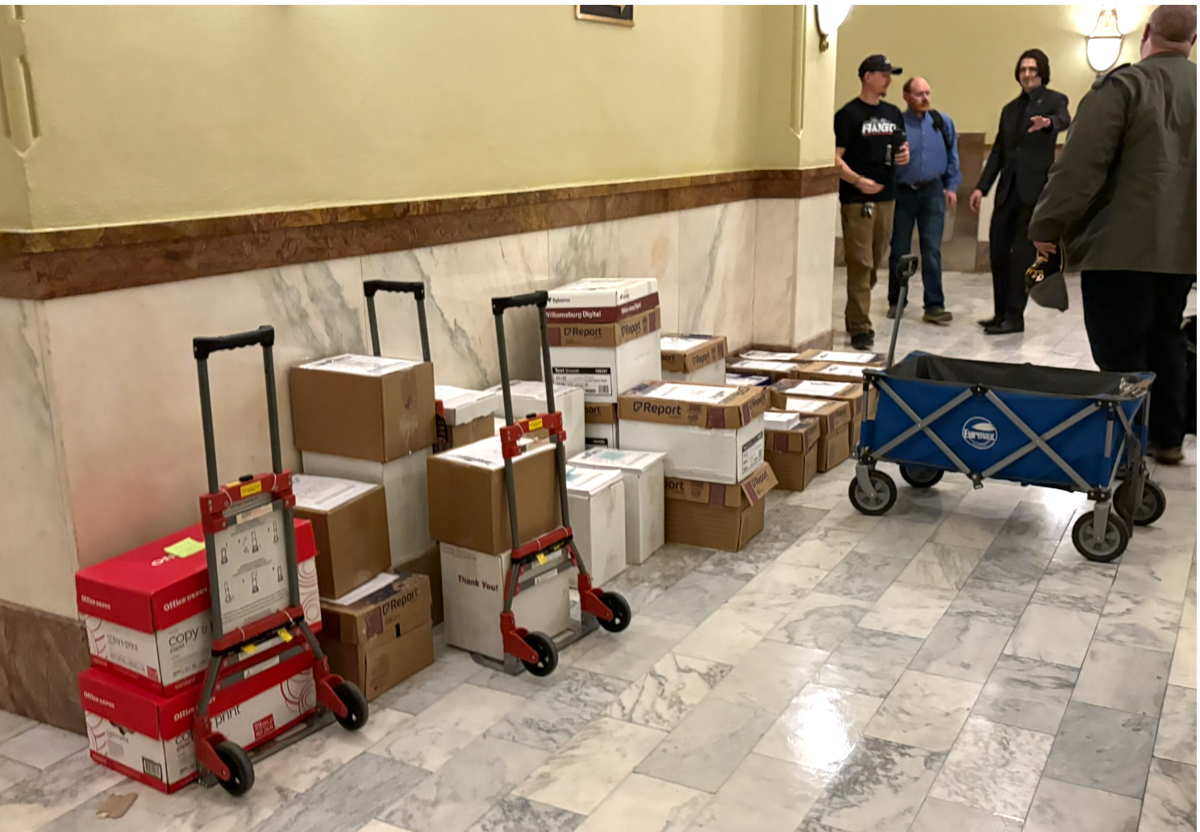Colorado senators give preliminary approval to ban firearms with detachable magazines
Colorado state senators wrapped up more than seven hours of debate on Feb. 14 and gave preliminary approval to a bill to ban firearms with detachable magazines, such as semiautomatic firearms and gas-operated semiautomatic handguns.
Hoping to avoid a gubernatorial veto, the Democratic sponsors of Senate Bill 3 added a myriad of exemptions.
The bill won its preliminary vote despite the absence of a Democratic senator and co-sponsor, and when opposition from moderate Democrats could make the final vote close. The Senate had begun the debate while missing what could be a key vote — Sen. Sonya Jaquez Lewis, D-Longmont, who has not been at the state Capitol for the past two days.
That final vote could happen as soon as Tuesday.
Senate Bill 3 would prohibit the manufacture, distribution, transfer, sale, and purchase of specified semiautomatic firearms and classify a device that increases the rate of fire of a semiautomatic firearm as a “dangerous” weapon. The bill’s prime sponsor is Sen. Tom Sullivan, D-Centennial, along with Sen. Julie Gonzales, D-Denver.
Among the eight amendments Democrats added to SB 3 Thursday night:
-
Upping the penalties for sale, possession or transfer of a high-capacity magazine from a Class 2 misdemeanor to a Class 1 misdemeanor;
-
Amending the list of weapons to which the law does not apply; and,
-
The addition of a lengthy section (the amendment was five pages) on safety education. The amendment, believed to be supported by the governor’s office, carves out from the law anyone who has taken a hunter education course, a basic firearms safety course, and an extended firearms safety course within five years of purchase. The extended safety course, which is 12 hours over two days, includes instruction on safe handling of semiautomatic weapons and ammunition magazines, safe stores, child safety, firearms deaths associated with mental illness, extreme risk protection orders and victim awareness and empathy.
Sullivan said the bill primarily works to enforce the 2013 law prohibiting high capacity magazines, but critics have said it goes far beyond that, with some referring to it as a de facto ban on “assault” weapons.
Sullivan held up a picture of the magazine that was used in the killing of a dozen people at the Aurora Theater in 2012, including his son, Alex. When the magazine jammed after 72 shots, the killing stopped, Sullivan told the Senate.
Seven months later, the legislature passed the law on high capacity magazines, limiting those magazines to 15 rounds.
But sheriffs aren’t prosecuting the offenses and they’re still being sold, and the shooter at the Boulder King Soopers used a high-capacity magazine, as did the shooter at the Club Q in Colorado Springs, he said.
He also railed against the “disinformation” around the bill, citing among a message he received a Fort Collins man who told him he believes Sullivan is personally coming for his guns.
After the bill is enacted in September, the only “assault style” weapons that could be sold in Colorado will have to have attached-style magazines, which he called a step in the right direction.
Law enforcement officers testified in committee that a fixed magazine is a safety issue, noted Sen. Rod Pelton, R-Cheyenne Wells.
Republicans also raised concerns about self-defense for veterans and for victims of domestic violence.
Several Democrats have indicated they would not vote for the bill, including Sens. Nick Hinrichsen of Pueblo and Marc Snyder of Manitou Springs, who was originally a co-sponsor of the bill. Several other Democratic senators also have been mentioned as potential “no” votes. All 12 Republican senators are expected to vote against it.
Snyder’s support changed when he realized the bill went beyond beefing up enforcement on the the state’s 2013 ban on high capacity ammunition magazines. “I didn’t think (SB 3) would be tied to a fixed magazine,” he added.
Snyder told Colorado Politics his district is “very against” anything that infringes on the right of law-abiding citizens to keep and bear arms.
“I hear as much from Democrats and unaffiliated (voters) as Republicans (about this),” he said.
Snyder also said he’s committed to responsible gun ownership and to supporting legislation that could reduce gun violence — but without infringing on people’s rights.
The bill’s bigger hurdle, however, may still be with Gov. Jared Polis, who had last year been skeptical about a state ban on assault weapons, believing it’s an issue best left for the federal government.
Polis has expressed concerns that SB3 could unfairly affect law-abiding gun owners who use firearms for hunting and sport.
On Thursday evening, sources said the governor’s office was working on “significant” amendments that might move some of those reluctant Democrats into a position of support.
That’s key to Sen. Tony Exum, Sr., D-Colorado Springs, who is in one of the most competitive seats in the state Senate.
He said his support could hinge on an amendment backed by the governor’s office and tied to safety instruction.
Exum noted that he’s already hearing rumors of a recall tied to the bill, and that he could be a target because of how competitive the district is. Exum won his 2022 race by 5 percentage points.
But Exum also said he is not in favor of voting for a bill the governor would veto.
Republicans have dominated the conversation, reading the U.S. Constitution and from the U.S. Supreme Court’s Heller decision in 2008 that said the Second Amendment protects an individual right to keep and bear arms for self-defense, rather than that right be extended only to state militias.
A second decision in McDonald from 2010 affirmed that the right to bear arms extends to the states.
Amendments from Republicans attempted to place limits on the bill’s implementation.
Sen. Janice Rich, R-Grand Junction, offered an amendment that said in order for the bill to be enacted, the state would have to experience a significant reduction in violent and property crime, a threshold of less than 100,000 crimes between Jan. 1, 2025 and Dec. 31, 2029.
Gonzales, in arguing for a “no” vote, said it is a way to delay the bill’s effective date for five years, as well as establish a correlation between the availability of the magazines and property crimes. There’s no evidence to suggest such a relationship exists, she said.
While senators debated amendments on the Senate floor, Sullivan and Ian Escalante of Rocky Mountain Gun Owners got into a pretty fiery debate of their own outside the Senate chambers. The group delivered dozens of boxes of petitions to the Capitol prior to the bill’s first committee hearing last month, but Sullivan called it “trash.”
“I have the votes to pass (this bill) and the governor will sign it,” Sullivan told Escalante.

Petitions against Senate Bill 3 from Rocky Mountain Gun Owners were delivered to the state Capitol prior to the Jan. 28 hearing in the Senate State, Veterans and Military Affairs Committee.
Marianne Goodland marianne.goodland@coloradopolitics.com

Petitions against Senate Bill 3 from Rocky Mountain Gun Owners were delivered to the state Capitol prior to the Jan. 28 hearing in the Senate State, Veterans and Military Affairs Committee.
The bill now awaits a final vote in the Senate and if it passes, it will head to the House for debate.












